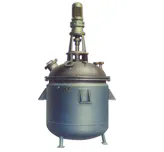Steam Heating Reactors: The Power of Steam in Industrial Heating
2024-08-21
In the world of industrial processing, efficiency and precision are paramount. Steam heating reactors have emerged as a vital component in various manufacturing and chemical processes, offering a reliable and effective means of heating. These reactors utilize the power of steam to achieve precise temperature control, which is crucial for ensuring product quality and process efficiency. In this blog, we'll explore the features, benefits, and applications of steam heating reactors, and why they are essential in modern industrial operations.
What Is a Steam Heating Reactor?
A steam heating reactor is an industrial device designed to heat materials or mixtures using steam. It consists of a reaction vessel where the material is processed, and a steam system that provides the necessary heat. The steam is typically generated by a boiler and introduced into the reactor to heat the contents indirectly. This method of heating is valued for its ability to provide uniform temperature control and efficient energy transfer.
Key Features of Steam Heating Reactors
1. Efficient Heat Transfer:
Steam heating reactors leverage the high thermal conductivity of steam to transfer heat efficiently to the reaction mixture. This results in faster and more uniform heating compared to other methods, improving process efficiency and consistency.
2. Precise Temperature Control:
One of the significant advantages of steam heating reactors is their ability to maintain precise temperature control. This is essential for processes that require exact temperature conditions to achieve desired product quality and chemical reactions.
3. Versatile Applications:
Steam heating reactors are versatile and can be used in a wide range of applications, from chemical synthesis and pharmaceuticals to food processing and wastewater treatment. Their adaptability makes them valuable in various industries.
4. Safety Features:
Modern steam heating reactors are equipped with safety features such as pressure relief valves, temperature sensors, and automated control systems to ensure safe operation. These features help prevent accidents and ensure the reactor operates within safe parameters.
5. Corrosion-Resistant Materials:
The materials used in the construction of steam heating reactors are selected for their resistance to corrosion and high temperatures. This ensures the longevity and durability of the reactor, even under demanding operating conditions.
6. Energy Efficiency:
By utilizing steam as a heating medium, steam heating reactors can achieve high energy efficiency. The steam's latent heat is effectively used to heat the material, reducing energy consumption and operational costs.
7. Automated Control Systems:
Many steam heating reactors come with advanced automated control systems that allow for precise regulation of temperature, pressure, and other process variables. This automation enhances process consistency and reduces the need for manual intervention.
Benefits of Using Steam Heating Reactors
1. Improved Process Efficiency:
Steam heating reactors provide efficient and uniform heating, leading to improved process efficiency. The precise temperature control helps ensure that chemical reactions and processing steps are completed effectively, resulting in higher product quality.
2. Enhanced Product Quality:
By maintaining consistent and controlled temperatures, steam heating reactors help achieve uniform product quality. This is crucial for industries where product specifications are stringent, such as pharmaceuticals and food processing.
3. Energy Savings:
The efficient heat transfer of steam heating reactors can lead to significant energy savings compared to other heating methods. This is achieved through the effective use of steam's latent heat, reducing overall energy consumption.
4. Safety and Reliability:
The safety features and robust construction of steam heating reactors contribute to their reliability and safe operation. This minimizes the risk of accidents and ensures continuous and dependable performance.
5. Flexibility and Adaptability:
Steam heating reactors can be customized to meet specific process requirements, making them adaptable to various applications. Their versatility allows for use in different industries and processes.
6. Reduced Maintenance:
The use of corrosion-resistant materials and automated control systems can reduce the need for frequent maintenance. This results in lower maintenance costs and less downtime.
Applications of Steam Heating Reactors
1. Chemical Manufacturing:
In the chemical industry, steam heating reactors are used for various chemical reactions that require precise temperature control. They facilitate the synthesis of chemicals, polymers, and other compounds.
2. Pharmaceutical Production:
The pharmaceutical industry relies on steam heating reactors for the production of drugs and medications. Precise temperature control is essential for achieving the required chemical reactions and maintaining product quality.
3. Food Processing:
Steam heating reactors are used in food processing for tasks such as cooking, sterilizing, and extracting flavors. They provide efficient and consistent heating, which is crucial for food safety and quality.
4. Wastewater Treatment:
In wastewater treatment, steam heating reactors are employed to treat and process wastewater through various methods, including thermal hydrolysis and sludge digestion. The controlled heating helps in the effective treatment of wastewater.
5. Cosmetics and Personal Care Products:
The production of cosmetics and personal care products often involves processes that require precise heating. Steam heating reactors help ensure consistent quality and performance of these products.
6. Textile Industry:
In the textile industry, steam heating reactors are used for processes such as dyeing and finishing. The uniform heating provided by these reactors is essential for achieving consistent results.
Choosing the Right Steam Heating Reactor
1. Assess Process Requirements:
Consider the specific heating requirements of your process, including temperature ranges, reaction times, and material properties. Choose a steam heating reactor that meets these requirements.
2. Evaluate Capacity and Size:
Select a reactor with the appropriate capacity and size for your application. Ensure that the reactor can handle the volume of material you need to process.
3. Check for Safety Features:
Ensure that the reactor is equipped with necessary safety features such as pressure relief valves, temperature controls, and emergency shut-off systems.
4. Consider Material Compatibility:
Choose a reactor made from materials that are compatible with the chemicals or materials you will be processing. Corrosion-resistant and durable materials are essential for long-term operation.
5. Review Energy Efficiency:
Evaluate the energy efficiency of the reactor to ensure that it meets your operational and cost-saving goals. Look for features that optimize energy use and reduce operational costs.
6. Consult with Experts:
If you are unsure about the best steam heating reactor for your needs, consult with industry experts or manufacturers. They can provide guidance and recommendations based on your specific requirements.
Popular Brands and Models
Several reputable brands offer high-quality steam heating reactors with advanced features and reliable performance. Some notable options include:
- Pfaudler: Known for its robust and versatile steam heating reactors, Pfaudler offers solutions for various industries, including chemical and pharmaceutical processing.
- De Dietrich: De Dietrich provides high-quality steam heating reactors designed for precise temperature control and efficient heat transfer. Their reactors are used in chemical and pharmaceutical applications.
- Buchiglasuster: Buchiglasuster specializes in steam heating reactors with advanced automation and safety features, suitable for demanding industrial processes.
Conclusion
Steam heating reactors play a crucial role in modern industrial processes, offering efficient, precise, and reliable heating solutions. Their ability to provide uniform temperature control, coupled with their durability and energy efficiency, makes them a valuable asset in various applications. By understanding the benefits and features of steam heating reactors, you can make informed decisions and enhance your industrial operations with this powerful technology. Embrace the advantages of steam heating reactors and optimize your processes with effective and efficient heating solutions.



